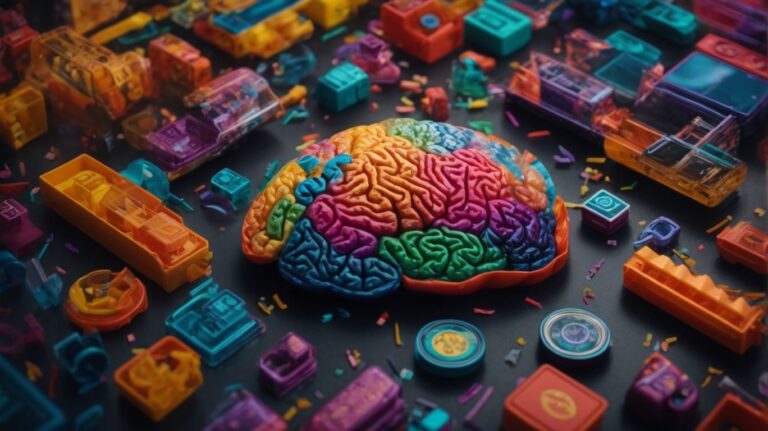Are you struggling to understand the dynamics of your relationships? Curious about the factors that impact your connections with others? Look no further than relationship psychology.
In this article, we will delve into the importance of understanding relationship psychology and explore the key factors that affect relationships. We will introduce you to the “Why Am I Still Single” Quiz, a valuable tool that can provide insights into your relationship patterns. Stay tuned to learn how this quiz can help you identify problem areas, seek professional help, and take steps towards self-improvement.
Contents
- 1 What Is Relationship Psychology?
- 2 Why Is It Important To Understand Relationship Psychology?
- 3 What Is The “Why Am I Still Single” Quiz?
- 4 What Can The Quiz Tell You About Your Relationship Patterns?
- 5 How Can You Use The Quiz To Improve Your Relationships?
- 6 Conclusion
- 7 Frequently Asked Questions
- 7.1 What is relationship psychology and how does it relate to the Why Am I Still Single Quiz?
- 7.2 Is the Why Am I Still Single Quiz only for people who are currently single?
- 7.3 How can taking the Why Am I Still Single Quiz benefit me?
- 7.4 Can the Why Am I Still Single Quiz accurately predict if I will find a partner in the future?
- 7.5 Do I need to have any prior knowledge about relationship psychology to take the quiz?
- 7.6 Are the results of the Why Am I Still Single Quiz confidential?
What Is Relationship Psychology?
Relationship psychology delves into the dynamics of interpersonal connections, dating behaviors, communication patterns, and self-improvement strategies within relationships.
Within relationship psychology, the focus is on understanding the intricacies of human interactions and the impact they have on romantic partnerships. It examines how individuals navigate the complexities of dating, addressing issues such as attachment styles, conflict resolution, and emotional intimacy. Communication challenges are another key aspect, where experts emphasize the significance of effective dialogue and active listening for fostering healthy relationships.
Relationship psychology offers valuable insights into personal growth within partnerships, encouraging individuals to engage in self-reflection and continuous improvement. By exploring one’s own beliefs, values, and emotional patterns, individuals can enhance their understanding of themselves and their capacity for building fulfilling connections with others.
Why Is It Important To Understand Relationship Psychology?
Understanding relationship psychology is crucial for fostering self-reflection, recognizing positive features in oneself and others, and building successful and fulfilling connections.
Through understanding relationship psychology, individuals can deepen their self-awareness by examining their own behaviors, preferences, and communication styles. This self-awareness enables them to pinpoint areas for personal growth and development, leading to increased emotional intelligence and better decision-making in relationships.
Delving into relationship psychology helps individuals appreciate positive traits not just in themselves but also in others. By recognizing and acknowledging these strengths, individuals can foster a more compassionate and empathetic approach in their interactions, cultivating healthier and more harmonious relationships.
What Are The Key Factors That Affect Relationships?
Several key factors influence the dynamics of relationships, including compatibility, mutual attraction, effective communication, and shared goals.
Compatibility plays a paramount role in how smoothly two individuals can coexist in a relationship. It involves aligning values, beliefs, and expectations to build a strong foundation. Mutual attraction, on the other hand, ignites the spark and keeps the passion alive. Effective communication acts as the bridge that connects partners, enabling them to understand each other’s thoughts, feelings, and needs.
Shared goals and aspirations provide a direction and purpose to the relationship, ensuring that both parties are working towards a common future. By balancing these essential elements, couples can nurture a healthy and fulfilling bond.
What Is The “Why Am I Still Single” Quiz?
The Why Am I Still Single quiz is a self-assessment tool designed to help individuals gain insights into their single status, dating patterns, and areas for self-improvement.
By diving into a series of thought-provoking questions, this quiz not only sheds light on potential reasons for being single but also offers a mirror to one’s dating behavior. It serves as a platform for introspection, allowing participants to uncover hidden relationship patterns and recognize areas where personal growth and development are needed. Through exploring responses and understanding underlying motivations, individuals can take proactive steps towards building healthier relationships and enhancing their dating experiences.
How Does The Quiz Work?
The “Why Am I Still Single” quiz operates by presenting targeted questions that prompt self-assessment, providing insights into relationship patterns, and offering personalized dating tips.
Each question in the quiz is strategically designed to uncover underlying aspects of one’s dating behavior and preferences, allowing individuals to reflect on their choices and tendencies. Through the self-assessment process, participants can gain a deeper understanding of their relationship dynamics and potential areas for improvement. The quiz’s algorithm analyzes responses to generate tailored advice based on the provided information, guiding users towards more fulfilling and successful dating experiences.
What Are The Different Categories Of The Quiz?
The “Why Am I Still Single” quiz categorizes responses into sections like fear of commitment, communication habits, insecurity, and past trauma to illuminate potential relationship obstacles.
Understanding how fear of commitment may manifest in one’s behavior can provide valuable insights into relationship dynamics. For some individuals, the fear of losing independence or being vulnerable can create challenges in moving towards a more serious commitment.
Communication habits, such as passive-aggressiveness or avoidance, play a crucial role in how well a relationship functions. Effective communication is key to resolving conflicts and building intimacy.
Exploring self-esteem issues and past traumas can shed light on patterns that hinder emotional connection and trust in relationships.
What Can The Quiz Tell You About Your Relationship Patterns?
Taking the quiz can reveal valuable insights into your relationship patterns, fostering self-assessment, reflection, and opportunities for personal growth.
When you engage in an assessment like this, you open a window into understanding the dynamics that govern your relationships. Through the quiz results, you may uncover behavioral patterns, communication styles, and emotional responses that often go unnoticed in day-to-day interactions. This self-reflection journey enables you to acknowledge areas where you excel and pinpoint where improvements can be made. By identifying these aspects, you lay the groundwork for personal development and fostering healthier relationships.
Fear of Commitment
The fear of commitment category in the quiz assesses one’s readiness for relationships, decision-making abilities, and attitudes towards marriage.
Individuals who fear commitment may struggle with relationship preparedness, often feeling unsure about taking the next step or committing to a long-term partnership. Their decision-making skills can also be influenced by this fear, leading to hesitation when faced with important choices in a relationship. Their perspectives on marriage might be colored by a sense of uncertainty or apprehension, causing them to view this institution with caution or skepticism.
Unhealthy Communication Habits
Evaluating unhealthy communication habits can highlight areas of potential relationship conflicts and underscore the importance of developing effective communication skills.
When communication breaks down, misunderstandings can arise, leading to unnecessary arguments and discord. Individuals may feel unheard or invalidated, causing feelings of frustration and resentment to fester. By recognizing these patterns and actively working to enhance communication abilities, one can create a more harmonious and understanding environment.
Insecurity and Low Self-Esteem
The quiz section on insecurity and low self-esteem sheds light on the significance of self-acceptance, self-care practices, and boosting self-esteem for healthier relationships.
Understanding and tackling feelings of insecurity and low self-esteem are crucial steps towards fostering healthier relationships. When individuals struggle with self-acceptance, it often manifests in various aspects of their relationships, hindering their ability to communicate openly and feel secure. Incorporating self-care practices, such as mindfulness, exercise, or hobbies, can play a significant role in improving one’s self-esteem and overall well-being, thus positively impacting the dynamics within relationships.
Unresolved Past Trauma
Exploring unresolved past trauma through the quiz can facilitate healing, encourage self-reflection, and pave the way for positive personal growth within relationships.
When individuals take the time to delve into their past experiences, they open the door to understanding how those traumas affect their present interactions. This process of introspection allows for the recognition of triggers, patterns, and emotional responses that may be rooted in unresolved issues. By acknowledging and addressing these past wounds, one can start the journey towards healing and growth, ultimately leading to healthier and more fulfilling relationships.
How Can You Use The Quiz To Improve Your Relationships?
Leveraging the insights from the quiz enables you to enhance your relationships through increased self-awareness, seeking professional guidance, and embarking on a journey of self-improvement.
Self-awareness, a key component in nurturing healthy relationships, allows you to recognize your own emotions, thoughts, and behaviors, thus fostering empathy and understanding towards your partner.
Engaging in practices that promote self-awareness, such as mindfulness exercises or journaling, can help you better control your reactions and communicate effectively in relationships.
Identifying Problem Areas
Identifying problem areas through the quiz aids in recognizing relationship challenges, fostering self-reflection, and initiating conflict resolution strategies.
By pinpointing areas that may be causing distress or tension in the relationship, the quiz serves as a valuable tool for partners to dive deeper into understanding their dynamics. This process of introspection can bring to light underlying issues that may have been overlooked or neglected, paving the way for meaningful conversations and conflict resolution techniques. It creates a platform for honest dialogue and encourages a proactive approach to addressing concerns, ultimately strengthening the bond and fostering a healthier partnership.
Seeking Professional Help
Engaging with professional resources, such as relationship coaches or therapists, can offer targeted guidance on areas like marriage readiness, conflict resolution, and effective communication.
Relationship coaches specialize in assessing both partners’ strengths and areas for growth, focusing on building a strong foundation for a lasting relationship. They can provide personalized strategies to enhance understanding, empathy, and emotional connection.
Therapists, on the other hand, offer a deeper exploration of underlying issues and patterns that may be impacting the relationship dynamics. Through structured sessions, they help couples navigate challenges, heal from past traumas, and develop healthier communication patterns.
Marriage counselors play a pivotal role in fostering a safe space for open dialogue and mutual respect. By facilitating productive conversations, they assist couples in finding common ground, rebuilding trust, and fostering intimacy.
Taking Steps Towards Self-Improvement
Embracing self-improvement practices post-quiz can nurture personal growth, encourage self-care routines, and foster self-acceptance for more fulfilling relationships.
Exploring avenues for personal development allows individuals to enhance their skills, broaden their perspectives, and become more resilient in facing life’s challenges. By engaging in self-care strategies, one can prioritize their mental and physical well-being, leading to a more balanced and fulfilling lifestyle.
Self-acceptance plays a crucial role in fostering healthy relationships, as accepting oneself allows one to embrace vulnerability, communicate authentically, and connect more deeply with others. Cultivating a sense of self-acceptance can lead to greater emotional intelligence and empathy in interpersonal interactions, contributing to stronger and more meaningful relationships.
Conclusion
In conclusion, understanding relationship psychology give the power tos individuals with tools for self-reflection, building successful relationships, and enhancing communication dynamics.
Relationship psychology delves deep into the intricacies of human connections, enlightening us on the complexities of our interactions with others and ourselves. By gaining insights into our own behaviors and triggers, we can identify patterns that hinder our personal growth and relationship development.
This awareness serves as a compass, guiding us towards fostering healthier bonds and cultivating empathy and understanding in our interactions.
Frequently Asked Questions
What is relationship psychology and how does it relate to the Why Am I Still Single Quiz?
Relationship psychology is the study of how individuals interact and form relationships with one another. The Why Am I Still Single Quiz is designed to analyze your thoughts, behaviors, and patterns in relationships to provide insight into why you may still be single.
Is the Why Am I Still Single Quiz only for people who are currently single?
No, the quiz is designed for anyone who is curious about their relationship patterns and may want to understand why they are still single. Whether you are currently single or in a relationship, the quiz can provide valuable insights into your relationship psychology.
How can taking the Why Am I Still Single Quiz benefit me?
By exploring your relationship psychology through the quiz, you can gain a better understanding of yourself and your patterns in relationships. This can help you make positive changes and improve your future relationships.
Can the Why Am I Still Single Quiz accurately predict if I will find a partner in the future?
While the quiz can provide valuable insights, it cannot accurately predict your future relationship status. It is important to keep in mind that relationships are complex and individual circumstances vary.
Do I need to have any prior knowledge about relationship psychology to take the quiz?
No, the quiz is designed for anyone to take regardless of their knowledge about relationship psychology. It is a fun and informative way to explore your relationship patterns and learn more about yourself.
Are the results of the Why Am I Still Single Quiz confidential?
Yes, the quiz is completely confidential. Your answers are not shared with anyone and are only used to generate your personalized results. Your privacy is important to us.



